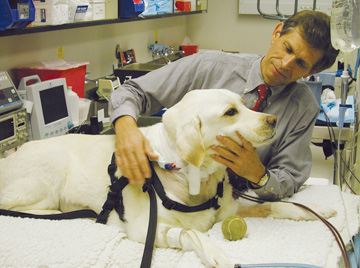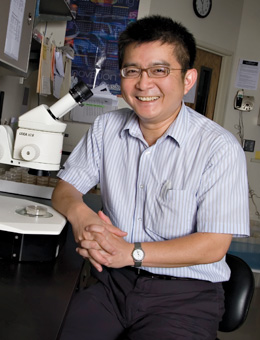Volume 25 · Number 1 · Fall 2007
Connections
From Bench to Bedside
Philanthropy supports medical advances for people and pets, all the way from laboratory studies to patient treatment.

Professor Larry Cowgill treats pets with state-of-the-art hemodialysis equipment, thanks to private support. (Don Preisler)
When Casey arrived at the UC Davis Veterinary Hospital six years ago, the black long-haired mixed-breed dog was in trouble. The antifreeze that had initially tasted so good was now poisoning her kidneys. Her owner, a well-known Hollywood producer, brought Casey to UC Davis, knowing that kidney dialysis was her only hope for survival.
The veterinary hospital is home to a unique state-of-the-art hemodialysis facility that provides 500–600 treatments over the course of a year to approximately 30 dog and 30 cat patients. While hemodialysis for animals has been available at
UC Davis for nearly 30 years, the treatment was once conducted using hand-me-down human machines rigged with salvaged parts. An initial gift of $50,000 in 1990 helped modernize the hemodialysis program, providing for sophisticated equipment better suited for dogs and, eventually, for cats.
This is just one example of how philanthropic support provides a critical resource for UC Davis researchers, physicians and veterinarians, enabling them to make new discoveries and develop innovative treatments to provide the best in patient care — whether the patient is a human or an animal.
“There are very limited funds for developing high-end veterinary care, so philanthropy plays a critically important role in highly specialized and costly therapy,” says Larry Cowgill, professor of medicine and epidemiology and director of the companion animal hemodialysis program. “That initial gift and others that followed allowed us to set up the first and only hemodialysis training program in the United States and the world.”
Having the equipment to save pets’ lives is useless if it’s too expensive for most owners to access, so private gifts can also bridge this potential divide. Casey pulled through her ordeal, and her owner was so grateful that he routinely contributes to an indigent care fund.
Building Blocks for Breakthroughs

Funding from a number of foundations supports neuro biologist Hwai-Jong Cheng’s basic research on the formation of neuronal circuits during brain development. (Karin Higgins/UC Davis photo)
Not all philanthropic gifts to research have such an immediate impact on patient care. Some basic science research may take years to translate from bench to bedside. But the benefits of basic research to clinical application should not be underestimated, says Hwai-Jong Cheng, an assistant professor at the Center for Neuroscience.
“Sometimes just supporting basic research can be tremendous because science is based on building blocks of understanding — basic research is the foundation of application,” says Cheng.
A neurobiologist with a medical degree, Cheng studies how neuronal circuits are formed during embryonic development, what molecules affect those connections and how that, in turn, affects behavior. Neurons or brain cells send out a tentacle-like axon to form connections with other neurons during development. After birth, extraneous axons are “pruned” away.
Sometimes, as in the case of a disorder known as synesthesia, that pruning goes awry. People with synesthesia may have a combined sense of taste and sight; a certain taste triggers them to see a different shape. Cheng says this is similar to a schizophrenic who hears or sees something that a “normal” person doesn’t. While neurological/psychiatric diseases are often thought of as the result of differences in neurobiological development, Cheng says the reasons are much more complex.
“The brain is a highly plastic system, and each person’s development is so different,” Cheng says. “We’re still evolving our definition of a ‘normal’ brain, and that definition may change in the future.”
But by examining the development process in mouse models and the nematode C. elegans, Cheng says he can better understand the neuronal disease process as it occurs in humans. Only by grasping that process can researchers develop better treatments for neurodevelopmental disorders such as autism, synesthesia and schizophrenia — or possibly even cures.
Cheng receives funding from numerous foundations for his research, including Autism Speaks, the March of Dimes Foundation, the Whitehall Foundation and the Klingenstein Fund.
Fighting Childhood Brain Tumors

A Sloan fellowship supports Assistant Professor Elva Diaz’s study of brain tumors. (Karin Higgins/UC Davis photo)
Three years ago, Cheng shared the distinction of receiving a prestigious Alfred P. Sloan Research Fellowship with Elva Diaz, an assistant professor in the department of pharmacology and toxicology. The fellowship, which aims to stimulate fundamental research by early career scientists and scholars of outstanding promise, provided both researchers with awards of $40,000 over two years.
Diaz also studies neural development, using mouse models to study the roles of individual genes and proteins at different stages. She is searching to better understand the function of certain molecules in the development of brain tumors — particularly in medulloblastomas, the most common form in children — to determine why they develop in the first place. Diaz hopes that her current line of research will one day lead to prevention.
“Philanthropic funds give researchers the opportunity to pursue studies that are more ‘risky,’” Diaz said. “We can follow up on novel ideas that may have a big pay-off later in terms of understanding a particular disease.”
Those initial sources of funding are also critical in helping to generate a substantial body of data that can then be used to apply for additional funding from the National Institutes of Health and other agencies.
When people choose to donate money to research, they often do so from a personal experience — a father with Alzheimer’s, a child with leukemia or a sister with breast cancer. Funding basic research doesn’t always come to mind, but for Pamela Tennant, who retired from the UC Davis Health System, the choice seemed perfect. She recently established an endowment for basic sciences and translational research.
“Because I worked in basic science research for 18 years at UC Davis, I understand and am very excited about the diverse questions that are being investigated that could have application to many medical conditions,” Tennant says. “When I decided to donate to medical research, I couldn’t choose one pursuit that I thought more important than all the others. With this endowment, investigators having promising research proposals can apply for funding regardless of their specific discipline.”
To learn more about how to support the research mentioned in this article or other UC Davis medical research, please contact Kelly Nimtz in the School of Veterinary Medicine at (530) 752-7024, Robert Avalos in the College of Biological Sciences at (530) 754-4894 or Stephanie Bray in the UC Davis Health System at (916) 734-9402.
For any other questions about making a gift to UC Davis, please contact the UC Davis Office of Development at (530) 757-3210.
Trina Wood is a Davis freelance writer.
